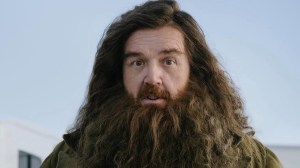Between films like Cheap Thrills, Starry Eyes, We Are Still Here, and Buster’s Mal Heart, filmmaker Travis Stevens has produced some of the best genre films of the past decade, collaborating with a number of emerging talents to cultivate the current landscape of independent horror. Stevens finally made the plunge to direct his first feature with Girl on the Third Floor in 2019, tapping wrestler CM Punk to star in his gross and gruesome haunted house experience about a husband atoning for the harm he’s brought to his family. Stevens’ latest effort, Jakob’s Wife, sees the filmmaker channeling a number of horror staples while reinventing them with contemporary influences to deliver a unique blend of themes for yet another ambitious and unconventional experience, which hits select theaters, On Demand, and Digital HD on April 16th.
Videos by ComicBook.com
In Jakob’s Wife, Anne is married to a small-town minister and feels like her life and marriage have been shrinking over the past 30 years. After a chance encounter with “The Master,” she discovers a new sense of power and an appetite to live bigger and bolder than before. As Anne is increasingly torn between her enticing new existence and her life before, the body count grows and Jakob realizes he will have to fight for the wife he took for granted.
ComicBook.com previously caught up with Stevens to talk his approach to the new film, his tenure in horror, and dream projects.

ComicBook.com: We’re here to talk about Jakob’s Wife, of course, but since we’re talking on March 11th, 3/11, I think all your fans want to know what your favorite 311 song is.
Travis Stevens: Who is 311?
No, you’re from the ’90s, you know what I’m talking about.
Are they a foreign band? I don’t know. I’m not playing that f-cking game with you. People are going to Google search my name, and that band’s name, and no, I won’t have it. I’m onto you. I am onto you, Wolfman. You don’t get it, you don’t get that sound bite.
All right, fair enough, I tried, but you shot me “Down,” I can respect that, but now you’ve got me “All Mixed Up” … do you see what I did there?
No, I don’t. I just didn’t want this interview to turn into a “Love Song.”
Okay, in all seriousness, you are a man who loves some snacks. We’ve talked about snacks before, snacks you had on your previous films. So to get things started, what was your favorite snack while filming Jakob’s Wife? What was the go-to snack when you needed some energy, you needed a charge?
That is a great question, and I don’t want to answer “bourbon,” so I’m trying to think of what else I ate on this. We were in Mississippi, so it was acclimating to local cuisine a little bit. I think my go-to snack may have been, f-ck man, I’m failing on this. I don’t know. I really don’t know. I was living in an AirBnB, out in the middle of nowhere, shopping at, basically, a regional version of a Foods-for-Less, and doing my best to just find vegetables. I don’t have a clearly defined snack. It was all a blur. The world was going into lockdown and I was just focused on trying to keep everybody happy and healthy in the midst of a global pandemic.
You made your directorial debut with “The Girl Who Lives in the House,” or “She Lived Upstairs,” whatever it was called.
“Chimney Girl.”
You made your feature directorial debut after producing roughly 700 movies. With that debut and then now into Jakob’s Wife, do you look back and wonder, “Why the hell did I wait so long to actually direct a film?” or do you look back on it as not being able to have directed a film 10 years ago without having learned so much by serving as a producer and developing films in so many capacities?
That’s a good question. I think I viewed them as the same thing. I mean, what you’re doing is you’re identifying the core of an idea and then you’re doing your best to nurture and develop it and then execute it. So the collaborations I’ve done as a producer with other filmmakers, I used the same skill set and approach as a writer and director. I will say, working with people like [Cheap Thrills director] Evan Katz and [Buster’s Mal Heart director] Sarah Adina Smith and Dennis [Widmyer] and Kevin [Kolsch] from Starry Eyes, [We Are Still Here director] Ted Geoghegan, all of that helped give me a confidence that it’s not a language that you don’t also have the ability to speak. I learned a lot from them and you just eventually have the competence to be like, “Yeah, I guess I could just sit and write this script. I guess I could direct it.” I think I’ll forever be grateful to the people who I worked with in the past, who could get me to this point, to help get me to this point.
Speaking to you having unearned confidence that you somehow have, when Barbara Crampton comes to you with this script saying, “Hey, we’re kind of interested in having you direct this,” was that a “holy crap” moment? Were you nervous about that, getting involved in it when a horror icon approaches you with it, or was that another vote of confidence? “Well, if she believes I can do it, let me take a crack at it.” Also, since this was an existing script that you worked on, how did your take on it change from what was originally there?
I wasn’t nervous because when I read the script, I immediately saw why it was the perfect movie for Barbara to make at this point in her career. I saw the potential that this could be a showcase role for her. If I hadn’t had that, such a strong clarity of vision, I probably would have been nervous because you don’t want to fumble your way through working with a legend. But it was clear, I just saw it and I was like, “Oh, okay. I see what it can be.”
I think a lot of my work on that screenplay, I guess there were a couple elements that I thought needed to happen. The one was we needed to focus the story entirely on Anne rediscovering her power. There had been a lot of extraneous activities going on in that script and I was like, “Let’s focus it on Anne becoming confident to state her lead again.” Then another thing was we want to make sure Barbara Crampton, this is a transformative role for her, wanting to make sure there were enough scenes in there that could show a big, dynamic range for her to really flex her muscles as an actor and show people, “Hey, look at me, I can do all this stuff.”
Another aspect was in this particular subgenre, trying to both pepper in tributes to what I considered to be classics of this subgenre, as well as some new contributions to the subgenre that maybe people in the future will look to and say, “Hey, that was really great, that type of scene.” Then, back to the character side, there’s this parallel between what Anne the character goes through that Barbara’s own story as a person and as an actor … again, she had this career going and then she stepped away from it to raise a family for 30 years and got back into acting recently and wanted to become more active as a storyteller herself. So having conversations with her about what her life was like, what that experience was like, and finding ways to incorporate those details into the script was another aspect of it.
And then, not to be spoilery, but the idea of The Master and what The Master offers Anne, the idea that it is not a, “Do you want to be with your husband or do you want to be with me?” Changing that dynamic to, “What do you want for yourself?” was a big change. And so I said, “Hey, I think we should make this Master character a woman. And I think we should take away any semblance of what a traditional vampire movie can be, where the vampire comes in and is trying to romantically seduce the woman, this is much more about you need to love yourself.” That was another thing. So not much, just a couple of little things.
As far as paying tribute to the vampire subgenre, there are some unexpected nods to classics like Nosferatu and Salem’s Lot. Were those visual inspirations in that original script or were those things you brought in yourself?
No, that was my … I think once I realized, “Hey, we’re going to gender-swap this character,” that allowed us to do some interesting things with it, and so the idea of honoring that classic design, but gender-swapping it, that was something that I got really excited about. And, luckily, everybody saw the value in that. So Salem’s Lot, Werner Herzog’s Nosferatu we use as another visual reference point.
You’ve been entrenched in the indie film world, but I know your production company, Snowfort Pictures, sells “Corporate Horror Still Sucks” shirts. Dennis and Kevin went from Starry Eyes to Pet Sematary. You worked with Adam [Wingard] and Simon [Barrett] on A Horrible Way to Die, and Adam just did Godzilla vs. Kong and they’re both making a new Face/Off. Even with your apprehension of a major studio production, is there a horror property that, no matter what studio made it, you wouldn’t be able to refuse?
Well, I haven’t worked in that system, so this could be naive, but I think you can make a good movie in any circumstances, if you have a strong enough idea for it. So, yeah, if somebody said, “Hey, Travis, would you be interested in looking at doing a version of Stephen King’s The Dead Zone?” I’d be stoked. Set that in the Trump age, oh man, that’d be delicious.
I’d also take a crack at Night School. Have you ever seen Night School?
No, I’ve seen Summer School, but I’ve not seen Night School.
Take a look at Night School, that’s a fun ’80s slasher. [Editor’s note: Stevens later confirmed that working on a G.I. Joe adaptation would be a “dream project.”]
*****
Jakob’s Wife hits select theaters, On Demand, and Digital HD on April 16th.
This interview has been edited for length and clarity. You can contact Patrick Cavanaugh directly on Twitter.
Header photo courtesy of Manny Carabel/Getty Images/RLJE Films









